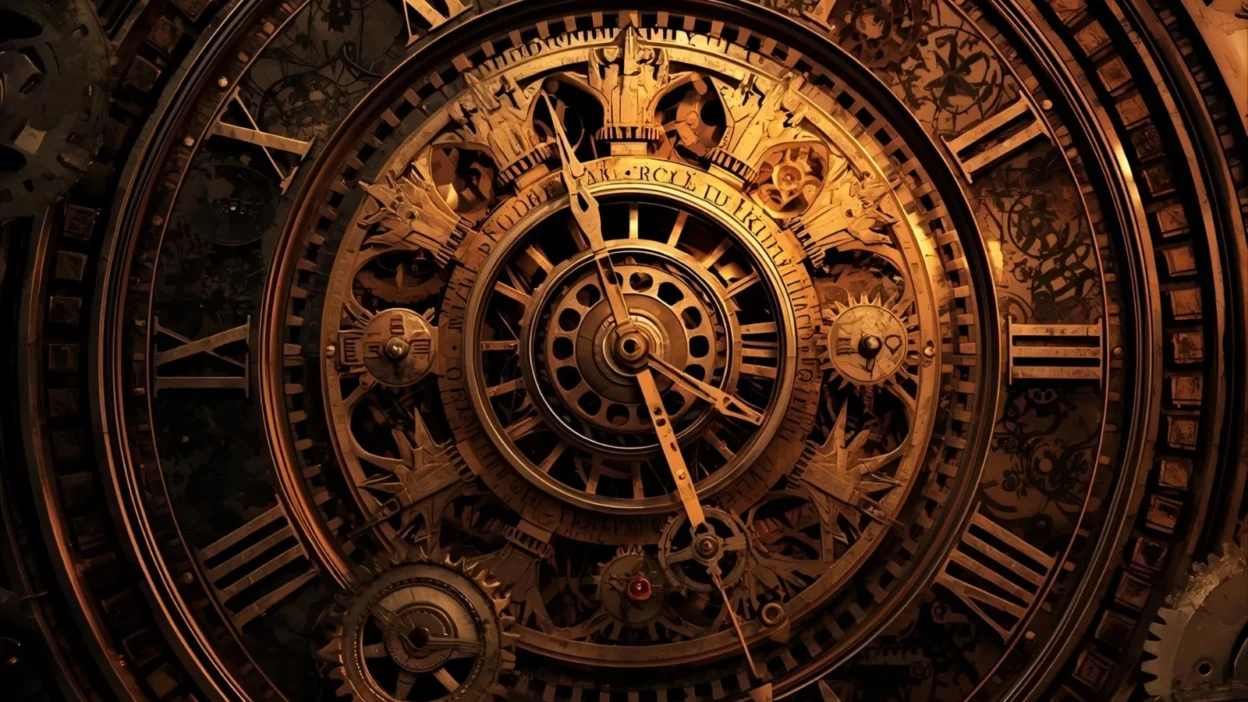Have you ever noticed how a simple glance at a clock can stir something inside you? Maybe you keep seeing 11:11, or your eyes always land on a specific time before something big happens. It feels like the universe is whispering — and maybe it is.
In 2025, people are more obsessed with time than ever — productivity apps, digital planners, and even smartwatches that track every heartbeat. Yet spiritually, seeing a clock goes far beyond keeping schedule. It’s a moment of awakening, a reminder that time is sacred, not stressful.
The spiritual meaning of seeing a clock often connects to your soul’s awareness of timing, destiny, and transformation. Whether in dreams, daily life, or literature, clocks carry messages about endings, beginnings, and divine alignment.
Let’s explore the clock symbolism in literature, life, and spirituality — and learn what it truly means when time keeps calling your attention.
Clock Symbolism in Literature
Clocks have always been powerful literary symbols — ticking reminders of life’s passage, mortality, and meaning.
- In many classic novels, the clock symbolizes change and impermanence — the way moments slip away, never to return.
- Writers use clocks to show characters’ awareness of mortality or lost opportunities.
- A stopped clock often symbolizes death, stillness, or emotional paralysis.
- In contrast, a working clock may symbolize hope, progress, or endurance.
- Authors like Virginia Woolf and F. Scott Fitzgerald used clock imagery to express time’s emotional weight.
- In spiritual literature, the ticking clock reminds readers of karma and divine timing.
- When a clock breaks, it often represents freedom from control or breaking free from routine.
- Poets describe clocks as “heartbeats of the universe,” tying them to the soul’s rhythm.
- A clock that chimes at midnight may symbolize awakening or revelation.
- Ultimately, clocks in literature show how time shapes our human experience — a mirror of both fear and faith.
Clock Symbolism in Life
In real life, clocks hold emotional meaning far beyond their mechanics.
- Every tick is a gentle reminder that time is passing, encouraging presence.
- For some, clocks represent discipline, responsibility, and structure.
- For others, they carry a spiritual lesson: you can’t control time, only how you live within it.
- Seeing a clock repeatedly might mean your intuition is awakening to divine timing.
- Clocks are tools of self-awareness, reminding you that your time on Earth has purpose.
- Broken clocks symbolize detachment from routine or inner imbalance.
- A clock that runs fast or slow might mirror your inner chaos or calm.
- Spiritually sensitive people often feel clocks reflect their emotional state — when anxious, time “moves differently.”
- Life itself is a clock — every sunrise a new hour, every heartbeat a tick closer to realization.
- Understanding clock symbolism in life helps us live more consciously, valuing each moment as sacred.
Clock Symbolism Spirituality
Spiritually, clocks are not just instruments of time — they are messengers of awareness and alignment.
- Seeing a clock at the same time repeatedly often means divine synchronization.
- Angels and guides may use time patterns (like 2:22 or 11:11) to get your attention.
- Clocks symbolize the cycle of reincarnation, renewal, and eternal flow.
- The circular shape of a clock mirrors the infinite nature of the soul.
- A clock’s hands move in unison — reminding us to align action and intention.
- Spiritually, clocks ask: Are you wasting time or walking your purpose?
- In meditative practices, awareness of time can become a doorway to mindfulness.
- Some people report clocks stopping during intense spiritual awakenings — a symbol of time standing still for transformation.
- The clock’s steady rhythm resonates with your heartbeat and spiritual timing.
- Ultimately, clocks remind us that divine timing is never late — just perfectly aligned.
What Does a Clock Represent Spiritually?
If you keep noticing clocks or specific times, it’s not random — it’s symbolic communication.
- Spiritually, a clock represents awareness of life’s flow.
- It’s a call to be present and live consciously in the “now.”
- Clocks remind us that every moment carries energy, lessons, and divine order.
- Seeing a clock unexpectedly can signal a shift in your vibration or destiny.
- For those on a spiritual path, it’s a wake-up call to purpose.
- Clocks also reflect spiritual maturity — knowing when to act and when to pause.
- When you feel “out of time,” it’s often because your spirit wants you to slow down.
- Spiritually, clocks symbolize the illusion of time—the soul lives outside of it.
- The clock face represents the balance between destiny and free will.
- To see a clock spiritually is to be reminded that every second is sacred.
Curious about meanings in text? Explore maeniing.com to discover clear explanations behind common and unusual words, phrases, and expressions!
How to Describe a Clock in Writing
Writers and storytellers often give clocks human-like emotion to deepen meaning.
- Describe the sound — ticking can be soothing or haunting.
- The motion of the hands can symbolize life’s momentum.
- A silent clock can represent lost time or introspection.
- Use adjectives like “ancient,” “relentless,” or “golden” to add symbolic depth.
- The color or design of a clock may suggest its energy — gold for divine order, black for mystery.
- Compare it to nature — “like the sun circling its own shadow.”
- A cracked glass can show fragility or emotional wounds.
- A melting clock (like Dali’s art) might symbolize distorted reality.
- Describing the hands meeting at twelve evokes completion and rebirth.
- In writing, a clock becomes a character of truth — it never lies, only reflects.
Clock Symbolizes Personality
The way you relate to clocks reveals much about your spiritual personality.
- If you’re always early, you value control and preparedness.
- If you’re often late, you trust intuition over structure.
- Someone obsessed with time may carry anxiety about purpose.
- Someone carefree about time might live from a spiritual flow state.
- A person who loves antique clocks often has a nostalgic or wise soul.
- A minimalist clock lover values simplicity and clarity.
- Digital clock fans prefer precision and modern energy.
- Those who dislike clocks may fear restrictions or endings.
- Spiritually, your clock habits mirror how you handle life’s timing.
- The clock you keep close reflects the tempo of your inner world.
What Does Clock Symbolize in Life?
The clock symbolism in life speaks to the heart of existence — change, rhythm, and awareness.
- A clock reminds us that life moves in cycles, not straight lines.
- It represents progress, reflection, and transformation.
- The ticking hand is like the heartbeat of creation.
- Life’s moments are the seconds — each one counts.
- The clock teaches us patience and impermanence.
- It symbolizes both urgency and surrender — knowing when to act and when to wait.
- A broken clock teaches acceptance — some things can’t be timed.
- Life’s clock stops for no one, reminding us to live with presence.
- Spiritually, the clock in life reminds us that eternity hides within every moment.
- Every time you check the clock, it’s a divine whisper: “Now is enough.”
What Does a Clock Symbolize in Literature?
In literature, clocks are often more than background details — they’re emotional anchors.
- A ticking clock adds tension, symbolizing inevitable change.
- In gothic tales, a stopped clock can mean loss or timeless sorrow.
- Romantic writers use clocks to express longing and waiting.
- Fantasy stories may use clocks as portals between worlds.
- In modern fiction, they often symbolize the pressure of modern life.
- A broken clock in a story might mean the end of illusion.
- Time loops and clock imagery explore destiny versus choice.
- Children’s tales use clocks as lessons in growth and awareness.
- The striking of midnight often signals rebirth or revelation.
- Through literature, clocks remind us that time is the truest storyteller.
Real-Life Scenarios: When the Clock Speaks
Scenario 1: The Midnight Awakening
Maria kept waking up at 3:33 a.m. every night. At first, she thought it was coincidence. But as she explored the spiritual meaning of seeing a clock at that hour, she realized her soul was awakening. It wasn’t about fear — it was about alignment. That time became sacred for journaling and prayer.
Scenario 2: The Broken Watch
Daniel’s favorite watch stopped working right after he quit his job. Instead of frustration, he felt peace. The broken clock symbolism became his spiritual sign to slow down and realign with purpose.
Scenario 3: The Perfect Timing
Jenna met her best friend after both noticed they always checked the clock at 11:11. That synchronicity became their personal reminder of divine timing — proof that some moments are meant to happen.
FAQs About Clock Symbolism
1. Why do I keep seeing the same time on the clock every day?
It may be a form of angelic or spiritual message — your soul recognizing divine timing.
2. What does a broken clock mean spiritually?
A broken clock often represents a pause, a reset, or freedom from pressure.
3. Can clocks be spiritual signs?
Yes! They can be signs from the universe, angels, or your higher self, guiding you to awareness.
4. What if time feels like it’s moving faster lately?
That’s your spirit noticing shifting energy — time perception changes with emotional or spiritual growth.
5. What’s the best way to honor clock symbolism in daily life?
Practice mindfulness and gratitude for each moment — treat every tick as sacred, not stressful.
Conclusion:
In the rush of modern life, we forget that time itself is spiritual — a living rhythm that connects our souls to the universe. The spiritual meaning of seeing a clock is a gentle nudge: Be here now. Breathe. Trust divine timing.
Clocks don’t just measure hours — they measure awareness. Every glance at the clock is a reminder that you’re part of something eternal. So next time you notice the hands align or numbers repeat, smile. The universe is keeping perfect time — and so are you. ⏰💫




